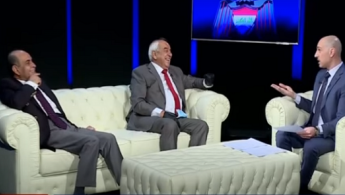'Coronavirus vaccine ready in September': Iraqi 'experts' panned after making extraordinary claims on TV show
On Thursday, the popular Iraqi TV channel Al-Sharqiya broadcast an interview with Salem Al-Bahadli, the director of the Al-Kindi Hospital in Baghdad and Jawad Al-Diwan, a Professor of Epidemiological Science at Baghdad University, in which they claimed that a coronavirus vaccine would be freely available in Iraq by September, 1.
Both Al-Bahadli and Al-Diwan are senior advisors to an Iraqi government task force on coronavirus.
Read more: Coronavirus worsens as Baghdad continues to grapple with lawless Iran-backed militias
In a clip from the show shared on Twitter, Al-Diwan said that American and Chinese vaccines against coronavirus had already been approved, with the Chinese one already "in use" in the United Arab Emirates after being tested on Chinese military personnel.
"We're going to get some of this Chinese-Emirati vaccine," Al-Diwan said, with the show's presenter, replying, "on 1st September".
"The illness will completely disappear," both the experts said.
"This is great news!" the presenter replied incredulously. "So a vaccine, which has been contracted for, will be available in Iraq on 1st September?"
"Yes, it will be here on 1st September," Al-Diwan answered.
"More than one company has a vaccine. The Germans worked on it early, then the French, then the Chinese, and the Russians are also working on a vaccine. Everywhere there is a vaccine," Al-Bahadli added.
While companies across the world are racing to develop vaccines against the coronavirus and some human trials have been conducted, no vaccine has been approved for general use and development of a safe vaccine is expected to take several months at least.
Coronavirus remains a danger throughout the Middle East and the world, with fears in many countries of a "second spike" after the relaxation of lockdown measures.
While some Iraqi Twitter users took the government experts' claims at face value, many castigated them for making irresponsible claims.
Abu Hasan, a law student, tweeted "Coronavirus, oh intelligent ones, is not something you can take lightly. It doesn’t have a vaccine or a treatment or anything… just care in the hospital and quarantine. Apart from this only God knows what your fate will be, just stop being irresponsible."
|
|
Faisal Saeed Al-Mutar, the Iraqi founder of the NGO Ideas Beyond Borders, which works to provide accurate information in countries ruled by authoritarian governments, warned of the dangers the disease still poses to Iraq.
"Iraq has the potential of turning into an epicentre of Covid-19, with ruined healthcare infrastructure and great mistrust of the Iraqi health ministry when it comes to public health messaging," Al-Mutar told The New Arab.
"Obvious misinformation like this will only further that mistrust," he warned.
"The Iraqi people deserve to know the truth from their officials so they can take the necessary precautions and not live on false hopes."
Ideas Beyond Borders has recently led an anti-coronavirus campaign in Iraq, providing over 140,000 masks to hospitals and the general public.
Talha Abdulrazaq, an Iraqi expert at the University of Exeter's Strategy and Security Institute, was more damning in his assessment.
"Iraqis have long known that those entrusted with their health and welfare are often political appointees and charlatans who attained their status by way of favours and the nepotism that is rife in the Iraqi system," he told The New Arab.
"Iraqis have no faith in their government to keep them healthy, and they will be further persuaded that is the case when they see these so-called experts making incredulous claims that are not even remotely challenged by media professionals they rely on to hold these snake oil merchants to account," he added.
Iraq has recently seen a major increase in coronavirus cases. 75,194 infections and 3,055 deaths have been recorded by the health ministry but a Reuters investigation suggested recently that the ministry may have deliberately under-reported cases, leading to a temporary revocation of Reuters’ licence to report from Iraq.

Follow us on Facebook, Twitter and Instagram to stay connected





 Follow the Middle East's top stories in English at The New Arab on Google News
Follow the Middle East's top stories in English at The New Arab on Google News


